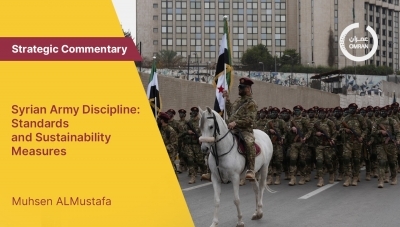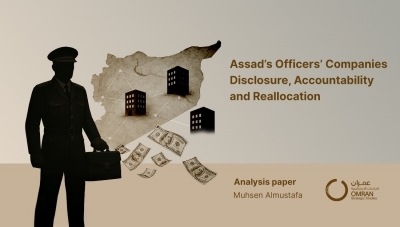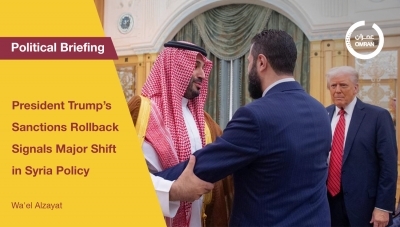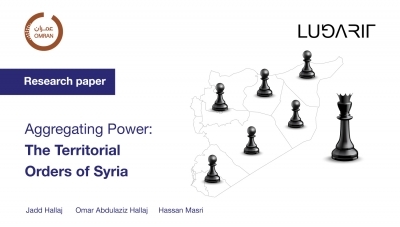Omran News
Palestinians of Syria.. Violation of Rights and Identity Challenges
Executive Summary
- Palestinian refugees in Syria have not been spared from the relentless violent policies of the Syrian regime. Gross violations have been committed against them, and they have experienced a rapid erosion of the rights afforded to them by both Syrian and international law. As of October 2019, documentation indicates that 3,995 Palestinian refugees in Syria—mostly young men—have been killed and 1,768 Palestinian refugees have been detained in the regime’s security and intelligence prisons. More than 568 Palestinian detainees of the victims, both male and female, have been tortured to death in regime detention. In addition, there have been 205 casualties who died due to starvation, lack of medical care, siege, and the semi-complete destruction of the Palestinian refugee camps of Daraa, Sbeineh, al-Sayida Zainab, and Handarat; the destruction of large parts of the camps in Khan al-Sheih and al-Husseinyeh; and the complete destruction of al-Yarmouk camp. Furthermore, more than 200,000 Palestinians have fled across the Syrian borders.
- Palestinian refugees in Syria have suffered and continue to suffer from intense threats and risks to their real property rights. Some of the Syrian laws issued in recent years provide cover for the government to strip owners of their own property. In addition, the tight security grip prevents the return of refugees and internally displaced persons (IDPs) to their original homes in the Palestinian camps. As a result, Palestinian refugees in Syria have experienced large-scale property expropriation for political purposes. At the same time, the USA and European countries still refuse to participate in the reconstruction of Syria until a political solution is reached and the United Nations Relief and Works Agency for Palestine Refugees in the Near East (UNRWA) is failing to shoulder the burden of rebuilding Palestinian camps due to its financial deficit and challenges to its very mandate.
- The relationship between UNRWA and the General Administration for Palestinian Arab Refugees (GAPAR) was governed by the checks and controls through which the Syrian authorities specified UNRWA’s role and the its geographical scope of work in Palestinian camps and communities. As a result of these restrictions and controls, UNRWA’s services have failed to reach the large number of refugees who need them, depriving thousands of refugees from the services and aid.
- Challenges facing the continuation of UNRWA’s mandate cannot be separated from the legal status of refugees, as UNRWA maintains the comprehensive civil record of the refugee assets in Palestine. This is considered the primary archive of transformations in their demographic status and a crucial source for confirming the international legal dimensions of their asylum.
- During the recent turmoil in Syria, the Palestine Liberation Organization’s (PLO) declared position of political neutrality towards the Syrian issue did nothing to prevent a series of marked violations of the civil rights of refugees. A profound shift in refugees’ perception of the PLO can be observed by looking at the positions of PLO’s leadership at various milestones in the conflict. Positions issued by PLO leaders contributed to covering up responsibility for the parties involve in such crimes as indiscriminate bombardment, siege, starvation, and detention of people in al-Yarmouk camp. Meanwhile, Palestinian factions loyal to the regime such as the Popular Front for the Liberation of Palestine – General Command, As-Sa’iqa, Fatah al-Intifada, Jabhat al-Nidal al-Sha'bi, and other militias, in addition to the Palestine Liberation Army, all participated in fighting alongside the regime and helped it impose the siege on al-Yarmouk camp.
- This research reveals the magnitude of the complex problems faced by Palestinian refugees in Syria by examining the paths of their migration and escape from the bloody war—which Palestinians in Syria lived through as their second catastrophe, or “Nakba”—and the crises and violations they have faced in neighboring countries and other places of exile. The failure of many States to comply with the 1951 Refugee Convention has magnified the suffering of refugees by denying them protection and aid, leaving them with limited options. As a result, many have found themselves and deprived of their rights and at risk of deportation and refoulement. This research presents various examples of the violations that Palestinian refugees have been exposed to due to their vulnerable legal status, such as: being detained in airports and holding centers for foreigners for long periods of time; being deported back to Syria or the threat thereof; being treated as foreigners or tourists rather than refugees fleeing a war; not being offered humanitarian assistance that would mitigate their suffering; etc.
- The risks and challenges facing the “Palestinian-Syrian identity” highlight the extent to which legal status and its transformations impact the holders of this identity. They face difficulties rebuilding and restoring their identity, not only in terms of place and collective memory, but also in terms of the disintegration of their legal status. This reveals a recognition of the importance of legal status and its implications for the configuration of identity and its open questions. It is especially so with the ambiguity of the future in Syria in general, and of options related to the legal status of Palestinians in Syria, in particular, opening the floor for multiple risks and challenges putting much doubt and posing major questions to the identity dialectic.
- One of the most important recommendations stemming from this research is to expose the Syrian authorities’ responsibility for the degradation of the legal status of the Palestinians of Syria. There should be a shift from monitoring and documenting violations to encouraging victims of these violations to take their cases to court in countries whose national laws allow for universal jurisdiction in such cases where the perpetrators committed war crimes and crimes against humanity. The research further recommends the formation of a special committee or commission to advocate for the property of Palestinian refugees in Syria and calls on all host countries and bodies concerned with managing the affairs of Palestinians of Syria to grant them their right of confirming their original Palestinian citizenship in all documents, records, and data. The findings demand that the PLO address the adverse effects of the lack of representation of refugees and urges the PLO to set up institutional mechanisms to unite the diaspora and represent their demands and rights. The research also emphasizes the importance of the persistence of UNRWA, the continuation of its foundational assistance mandate, and the exposure of schemes aimed at eliminating the cause of the refugees and eradicating their right of return to their homeland in Palestine as per UN General Assembly Resolution 194 (III).
- In light of the magnitude of issues facing Palestinians in Syria, including the disintegration of their legal status, the continued attrition of their presence inside Syria, and the difficulties faced by those forced to migrate and flee to other countries, all attempts to remedy and restore their status will depend on the course of and end to the conflict in Syria. There appear to be few current approaches or solutions that may reassure Palestinians about the future of their presence in Syria and move them towards a more secure legal status that guarantee their rights.
Economic Recovery in Syria: Mapping Actors and Assessing Current Policies
Introduction
The conflict in Syria that has been dragging on since 2011 generated many challenges that began to take shape as the conflict is coming to an end. Some of the key challenges pertain to early economic recovery which has already started in the various areas of the country, with their different influences, needs, resources and potentials. Given the current situation in Syria—with the consolidation of zones of influence and the faltering political process -local, regional, and international policies have begun to adapt to this reality, with key stakeholders launching early economic recovery projects in the established zones of influence.
The political and military landscape in Syria remains precarious and questions of the capacity of different actors, reality of these regions and the political context pertaining to economic recovery in these areas must be addressed in order for stakeholders to successfully implement early recovery projects. Accordingly, the Omran Center for Strategic Studies has developed a research series to understand the dynamics, political compass, requirements, and challenges of these early recovery projects so for them to facilitate the establishment of stability on the ground.
Early recovery is critical because it is the phase that is supposed to transition the country from conflict to peace and stability and lay the foundation for the subsequent reconstruction process. This phase has political and social dimensions that are of equal importance to its economic dimension. The political dimension involves working to stop violence throughout the country, establishing new governance institutions, and reaching a political solut3. Autonomous Administrationion that generates stability. The social dimension includes relief work, accommodations and housing for refugees, and national reconciliation after the preparation of an appropriate security environment. The economic dimension includes the restoration of basic public utilities, relaunching of the economy moving, rebalancing the macroeconomic framework, and dismantling the components of the conflict economy in areas both outside of and under state control. The above political, social, and economic elements are significantly intertwined and success in any one area depends on success in the other two.
The research orientation of Omran Center assumes that the coming phase in Syria will take place in a military post-conflict setting and that a most likely scenario to play out will be one of two: The first scenario is the instilment of the zones of influence: a ‘useful Syria’ with Iranian and Russian influence, eastern Syria with Western-Arab influence, and northern Syria with Turkish influence. The second scenario is continued investment in the ceasefire by regional and international actors, with priority placed on declared or undeclared negotiations to reach a new form of authority in which the existing regime maintains the largest share, thanks both to the efforts of its allies and the regime’s success in retaining the mechanisms of control.
The overall objectives of the research orientation of Omran Center are to identify criteria for an effective early economic recovery that is conducive to stability and development and to create a policy framework for implementing those recovery efforts. This research also aims to define the requirements and conditions for early recovery as they relate to security, governance, and development and to reach a position regarding the regime’s ability to handle Syria’s post-conflict challenges and to implement recovery and reconstruction policies. In this context, Omran has produced five reports:
1. A political analysis paper on the political context of early recovery in Syria;
2. An analytical paper of early economic recovery in Syria: challenges and priorities;
3. A paper on the political economy of early recovery in Syria;
4. A study on Early Recovery in Syria: An Assessment of the Regime’s Role and Capability; and 5. A study on the Turkish approach to early economic recovery in Syria, Euphrates Shield area as a case study.
For More Click Here: http://bit.ly/2lHvGit
Note of Appreciation
Omran for Strategic Studies expresses its gratitude for support received from Konrad-Adenauer-Stiftung.
The Future of the Conflict in Syria
In coordination with Omran Center For Strategic Studies, Syrian American Council, and Syrian Forum USA a discussion session was coordinated on 14 Sep 2019, in Washington DC in America entitled "The Future of the Conflict in Syria" and what will be the field and political developments? Senior fellow Dr. Sinan Hatahet at omran center participated and considered that the challenge in 2020 to the Syrian revolution is to try to stop the bleeding and redefine the negotiating path with the regime by finding new understanding and spaces with the United States and the European Union. This leads to the formation of a new opposition bloc that relies on its own sources




